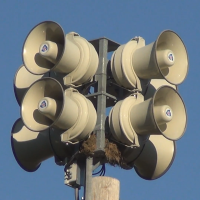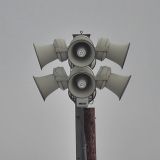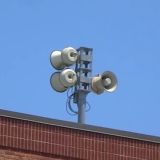E-Class: Difference between revisions
m (Added to American Signal Corporation category) |
ArxCyberwolf (talk | contribs) (Added images.) |
||
| (12 intermediate revisions by 6 users not shown) | |||
| Line 1: | Line 1: | ||
{{Infobox siren | {{Infobox siren|title=ASC E-Class|image=E-Class.png|company=[[American Signal Corporation]]|produced=2007-Present|type=[[Directional]] [[Electronic]]|output=109-126 dB @ 100 ft|hz=60|wattage=400-3200 W|voltage=24|current=DC|caption=An ASC E-Class EC-8, located in DePue, IL. Image credit to Montecat 33.}}The '''E-Class''' is a series of directional electronic sirens that is produced by the American Signal Corporation. Very similar in appearance to the ATI [[Acoustic Technology, Inc.|HPSS series]] (and often confused with such), the E-Class is ASC's budget electronic siren offering, alongside the more expensive omnidirectional [[ASC i-FORCE|i-FORCE]] and the smaller [[ASC Clarity|Clarity]] campus siren. These are intended for public notification purposes, as well as primarily a siren. It is also related to the [[Alerting Solutions, Inc.|ASI HA]] series. | ||
| | |||
|company = American Signal Corporation | |||
|produced = | |||
|type = [[Electronic]] | |||
| | |||
}} | |||
The '''E-Class''' is | |||
== History and design == | |||
[[File:Swivelled E-Class.jpg|left|thumb|160x160px|An ASC E-Class EC-8 with its horns swiveled downwards, located in Michigan City, IN. Image by amtrak3501.]] | |||
The E-Class series was introduced sometime around 2007, as a cheaper electronic alternative to the i-FORCE. These sirens make use of 1-8 speakers per array, with a maximum of 8 speakers being supported. These speakers are manufactured by [[Kingstar Sound Industry, Ltd.|Kingstar Technologies]] out of Taiwan, and are the same speakers used in many other electronic sirens, including the ATI HPSS series. By doing so, ASC reduced the cost of the siren by avoiding having to create their own molds and designs. Each speaker contains 4 100 W speaker compression drivers, manufactured by Atlas, with a maximum of 3200 W being supported. The drivers are housed in the circular section behind each horn. Each speaker is attached to the mount by two legs that can swivel up to 45 degrees in any direction, depending on how they are mounted. The model number for each siren refers to how many speakers the array has, ranging from the single horned EC-1 to the 8 horned EC-8. The most common configurations are the EC-4 and EC-8. Each speaker has ASC's logo printed on the cones. | |||
[[File:E-Class EC-3.jpg|left|thumb|160x160px|The E-Class supports many configurations to suit customer needs, including some very unconventional setups such as this EC-3 located in Williamsburg, VA. Image by Wisconsin Sirens & Elevators.]] | |||
Each array is attached to a rectangular metal frame that supports the speakers, and each speaker can be attached to nearly anywhere on the frame in any direction. The frame varies in height depending on the speaker configuration. Units with only one row of speakers come with a shorter frame, while units that use two rows of speakers use a taller frame, even if the array only has four or less speakers. The frame is usually open, however they can be ordered completely sealed to protect the wiring if desired. While the frame does come with the siren as standard, it is not necessary to mount the speakers to this frame. This frame has thicker legs and supports more configurations than the ATI HPSS frame does, which makes it the most effective way of telling the two apart, among smaller differences. The frame attaches to the side of a pole the same way ASC's other sirens do. | |||
Each unit comes with a standard ASC controller that runs on 24 V DC, which includes battery backup and voice capabilities alongside ASC's standard siren tones. The siren can run for up to 30 minutes on batteries after mains power is lost. These sirens are not very common as ASC has failed to establish themselves into the electronic siren market as effectively as its competitors such as Whelen's [[Whelen WPS-2900|WPS-2900]] and Federal Signal's [[Federal Signal Modulator|Modulator]] and [[Federal Signal DSA|DSA]], but where they are found, they are quite effective. Due to their better controller and drivers, these sirens often outperform and are more reliable than their closest competitor, the ATI HPSS series. | |||
[[Category:Sirens]][[Category:Single Toned Sirens]][[Category:Electronic Sirens]][[Category:Omnidirectional Sirens]][[Category:Directional Sirens]] | [[Category:Sirens]][[Category:Single Toned Sirens]][[Category:Electronic Sirens]][[Category:Omnidirectional Sirens]][[Category:Directional Sirens]] | ||
[[Category:American Signal Corporation]] | [[Category:American Signal Corporation]] | ||
__INDEX__ | |||
Latest revision as of 16:47, 8 October 2024
| ASC E-Class | |
 An ASC E-Class EC-8, located in DePue, IL. Image credit to Montecat 33. | |
| Company | American Signal Corporation |
|---|---|
| Produced | 2007-Present |
| Type | Directional Electronic |
| Sound output | 109-126 dB @ 100 ft |
| Frequency | 60 Hz |
| Wattage | 400-3200 W |
| Voltage | 24 V DC |
The E-Class is a series of directional electronic sirens that is produced by the American Signal Corporation. Very similar in appearance to the ATI HPSS series (and often confused with such), the E-Class is ASC's budget electronic siren offering, alongside the more expensive omnidirectional i-FORCE and the smaller Clarity campus siren. These are intended for public notification purposes, as well as primarily a siren. It is also related to the ASI HA series.
History and design

The E-Class series was introduced sometime around 2007, as a cheaper electronic alternative to the i-FORCE. These sirens make use of 1-8 speakers per array, with a maximum of 8 speakers being supported. These speakers are manufactured by Kingstar Technologies out of Taiwan, and are the same speakers used in many other electronic sirens, including the ATI HPSS series. By doing so, ASC reduced the cost of the siren by avoiding having to create their own molds and designs. Each speaker contains 4 100 W speaker compression drivers, manufactured by Atlas, with a maximum of 3200 W being supported. The drivers are housed in the circular section behind each horn. Each speaker is attached to the mount by two legs that can swivel up to 45 degrees in any direction, depending on how they are mounted. The model number for each siren refers to how many speakers the array has, ranging from the single horned EC-1 to the 8 horned EC-8. The most common configurations are the EC-4 and EC-8. Each speaker has ASC's logo printed on the cones.

Each array is attached to a rectangular metal frame that supports the speakers, and each speaker can be attached to nearly anywhere on the frame in any direction. The frame varies in height depending on the speaker configuration. Units with only one row of speakers come with a shorter frame, while units that use two rows of speakers use a taller frame, even if the array only has four or less speakers. The frame is usually open, however they can be ordered completely sealed to protect the wiring if desired. While the frame does come with the siren as standard, it is not necessary to mount the speakers to this frame. This frame has thicker legs and supports more configurations than the ATI HPSS frame does, which makes it the most effective way of telling the two apart, among smaller differences. The frame attaches to the side of a pole the same way ASC's other sirens do.
Each unit comes with a standard ASC controller that runs on 24 V DC, which includes battery backup and voice capabilities alongside ASC's standard siren tones. The siren can run for up to 30 minutes on batteries after mains power is lost. These sirens are not very common as ASC has failed to establish themselves into the electronic siren market as effectively as its competitors such as Whelen's WPS-2900 and Federal Signal's Modulator and DSA, but where they are found, they are quite effective. Due to their better controller and drivers, these sirens often outperform and are more reliable than their closest competitor, the ATI HPSS series.